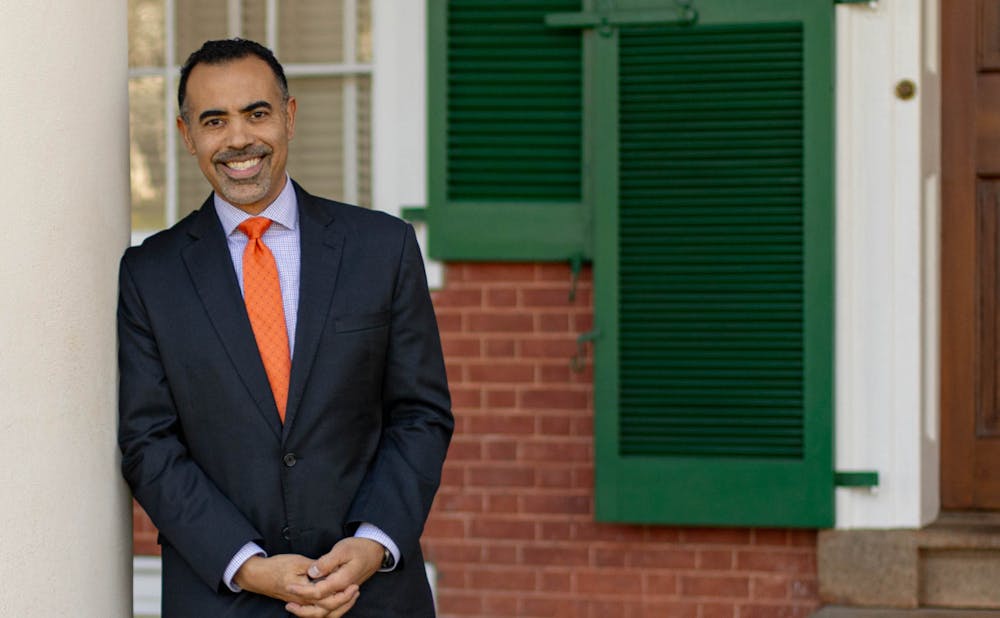Ian Solomon, dean of the Batten School of Leadership and Public Policy, was reappointed for a second five-year term per a University announcement released Jan. 19. The third dean of the Batten School since its founding in 2007, Solomon enters his second term with ambitious plans for the Batten School, including a Batten-specific 2030 plan.
Ian Baucom, University executive vice president and provost, announced Solomon’s reappointment last week, praising his leadership and his relationship with the Batten community.
In a statement provided by a University spokesperson, Baucom said, “[Ian Solomon] models what it means to be a values-based leader and has wisely led Batten while developing a 2030 strategy to shape Batten’s second decade. He is a generous University citizen, and is accessible, approachable and beloved by students.”
Solomon has worked throughout his term with the University to develop a 2030 plan for the Batten school that aligns with the broader University goal of becoming the best public university by the year 2030. Solomon described the Batten 2030 plan as dedicated to three high priority areas: access, influence and innovation.
The “access” portion of Solomon’s plan seeks to expand Batten’s accessibility to students from different backgrounds. Solomon’s goals include providing more support for community college students to have an opportunity to apply to Batten, diversifying the population of the Master of Public Policy program, and creating opportunities for working professionals through more online degree and non-degree programs.
“We try to get students from… every territory across the US and beyond, so that we can really reflect more of the experiences and perspectives of people all across this democracy,” Solomon said.
Online learning also provides Batten the chance to implement what Solomon calls the “worldwide classroom,” taking education beyond Grounds and enabling learning and connection that otherwise might not be possible. Jay Shimshack, Batten professor of public policy and economics, openly embraced the plan, hoping that it would make it possible for the Batten mission to impact a wider, even global, community.
“I’m excited about the notion of a worldwide classroom, and … by the notion of the great things of the Batten school reaching more people,” Shimshack said.
The second pillar of Solomon’s 2030 plan, “influence,” is aimed at improving the Batten school’s visibility, particularly as it relates to research and policy in the United States.
“We have amazing faculty that are doing cutting edge research on policy areas as well as the dynamics of leadership,” Solomon said. “I want to make sure that the work they're doing is having an influence on decision making, and the quality of leadership and the quality of policymaking that’s taking place around the world.”
Solomon described “innovation,” the final part of the Batten 2030 plan, as a testament to the Batten school’s founder, entrepreneur Frank Batten, and his commitment to continuous improvement.
Solomon pointed out the innovative steps that the Batten school has already taken — like the new building at the Emmet-Ivy corridor that the Batten school will share with the Karsh Institute of Democracy beginning in 2026. Solomon said he hopes to provide opportunities for Batten students to gain international exposure through community engagement and study abroad programs.
Solomon’s term has been marked by a variety of tumultuous global events, from the COVID-19 pandemic to the Russia-Ukraine war. According to Solomon, his focus throughout these challenges was on keeping the community united and teaching Batten students how to be of service during difficult times.
“I love the passion of the Batten students and [I am] really drawn to the mission of developing leaders and creating knowledge to help humanity bridge divides, solve current and emerging policy problems and heal the fractures in our communities,” Solomon said. “That mission inspired me five years ago and feels even more urgent, more critical, more inspiring today.”
Originally trained as a lawyer, Solomon has worked on international and domestic economic development, conflict resolution in areas such as geopolitical disputes and U.S. race relations, teaching and consulting. Formerly an associate dean at Yale Law School, Solomon went on to work in the Obama administration and was confirmed by Congress to be the U.S. Executive Director of the World Bank Group. Before joining the Batten school, Solomon ran his own consulting practice, SolomonGlobal.
Solomon said when he was first contacted by the University’s executive search group over five years ago, he hoped to make a client out of the Batten school rather than begin working for them. However, his meeting with Batten faculty and students so impressed him that he decided to apply for the dean position. Now going into his second term, Solomon said he remains as excited and inspired by the Batten community and its mission as ever.
Shimshack said Solomon’s reappointment was “great news” for the Batten school, as well as for the University community more broadly.
“[Solomon has] been a superb leader,” Shimshack said. “He’s collaborative, he’s inclusive. He has a clear vision, but is always receptive to input and he’s genuinely committed to a shared culture of both excellence and support for one another. That was true during the toughest times of the pandemic, and to my eyes remains true to this very day.”
Solomon’s upcoming term will officially begin Sep. 1.







